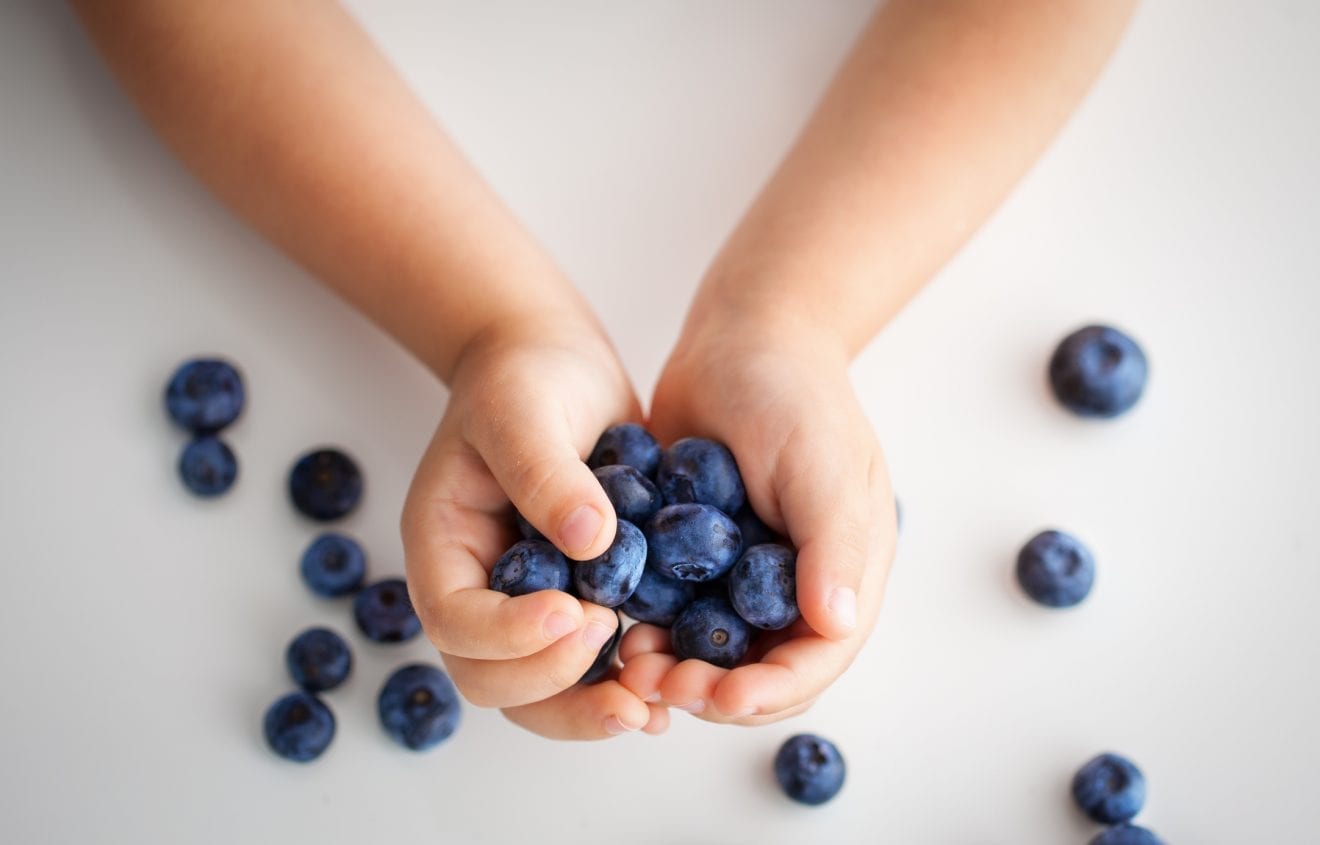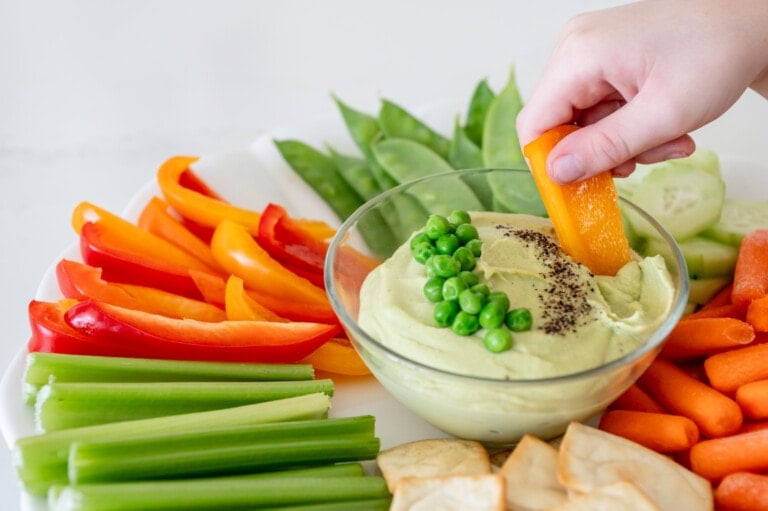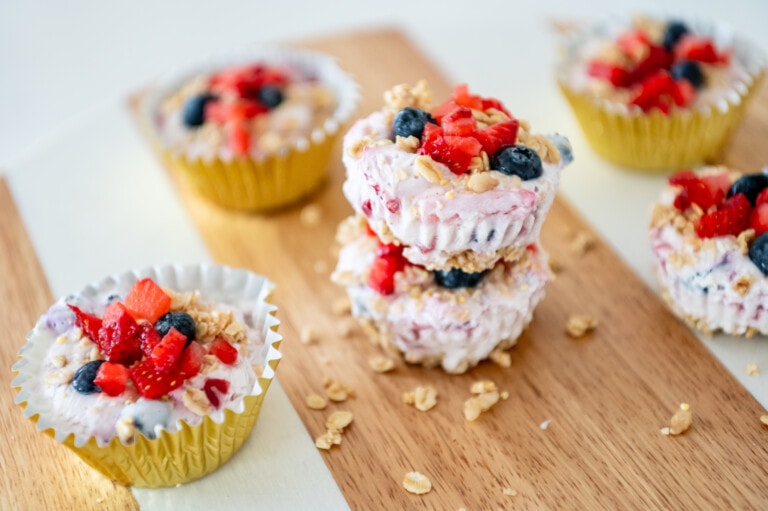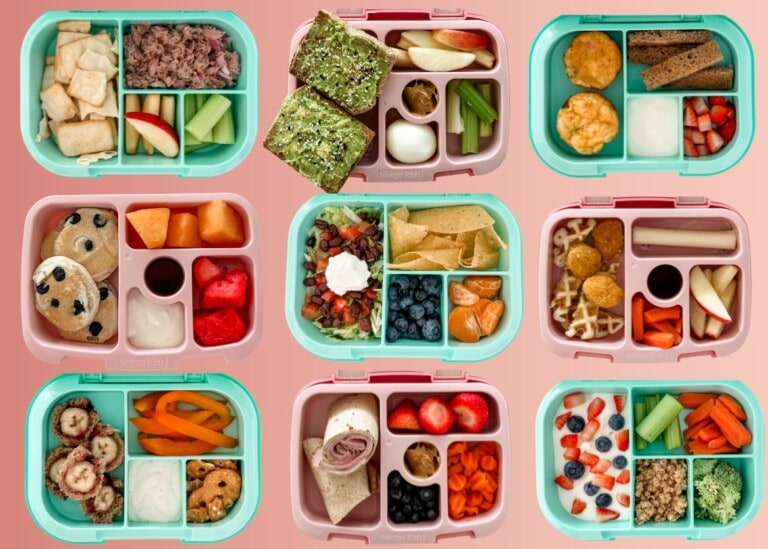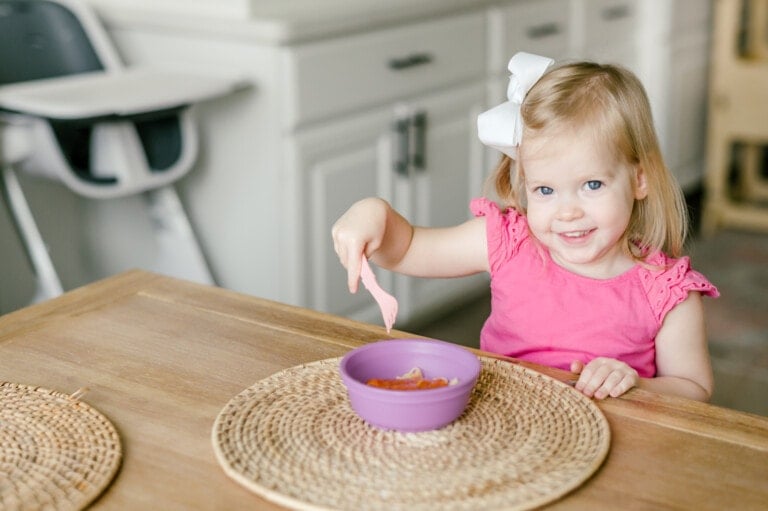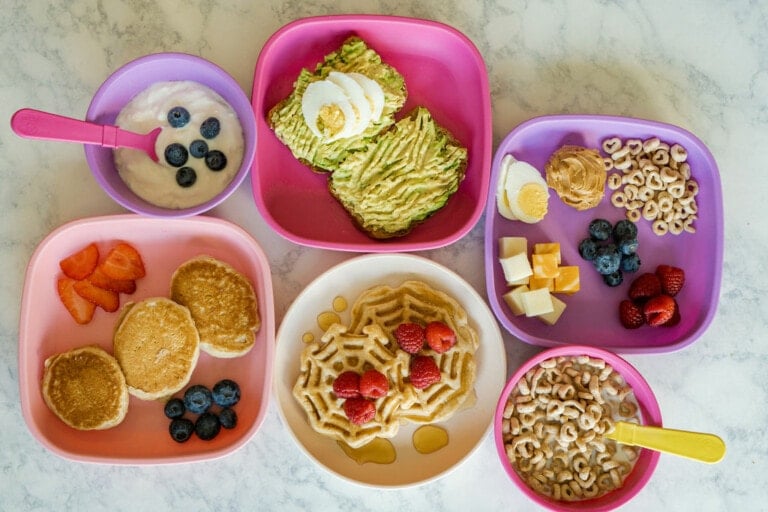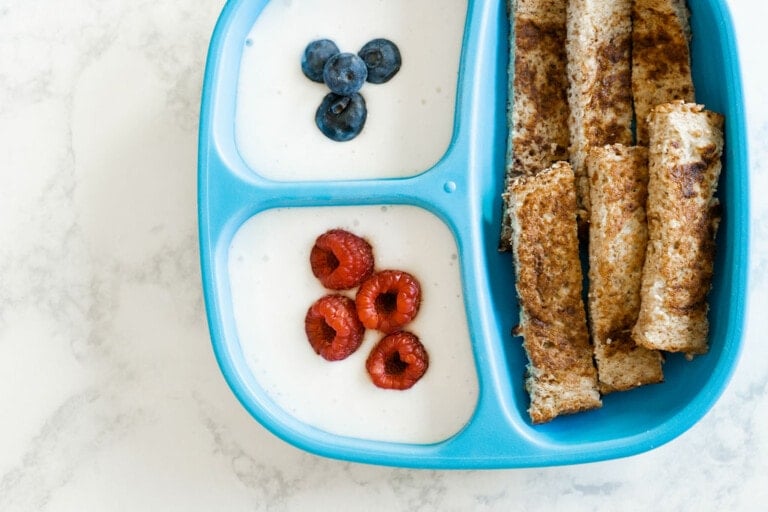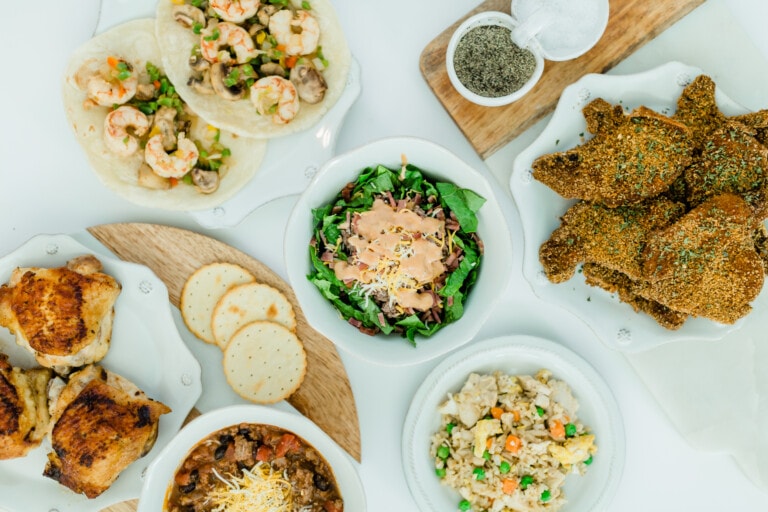Nutrition for your children directly affects their IQ, learning, concentration, sleep, and behavior.1,2,3 Just as professional athletes eat a specific diet to improve their performance, children can eat to learn better. Foods that contain antioxidants, choline, omega-3 fatty acids, and complex carbohydrates are all particularly helpful in boosting brain power.8,9,10 But what specific brain-boosting foods should you add to your kids’ diets? Here, I’ll share some food tips to give your children a brain-power boost and several of my favorite recipes!
7 Brain-Boosting Foods for Kids (With Recipes)
Check out these seven brain-boosting foods for kids and their benefits, along with easy recipes incorporating these foods that you can make for your little ones:
1. Blueberries
Blueberries have the highest antioxidant concentration compared to any other fruits or vegetables. They contain powerful anthocyanins, which Tufts University has connected with improved short-term memory performance and attention to tasks. A study showed superior memory test results for kids consuming blueberries than children who aren’t consuming berries.12,13 The benefits of regular berry consumption also extend to adults, as it’s linked to decreasing the aging process, potentially preventing dementia. These are a great sweet treat that kids either love or will learn to love with a little effort.11
Kids can enjoy the benefits of this fruit with frozen blueberries, which tend to be cheaper and don’t lose their potency. Here are a couple of fun recipes using blueberries:
Pineapple Blueberry Smoothie Bowl
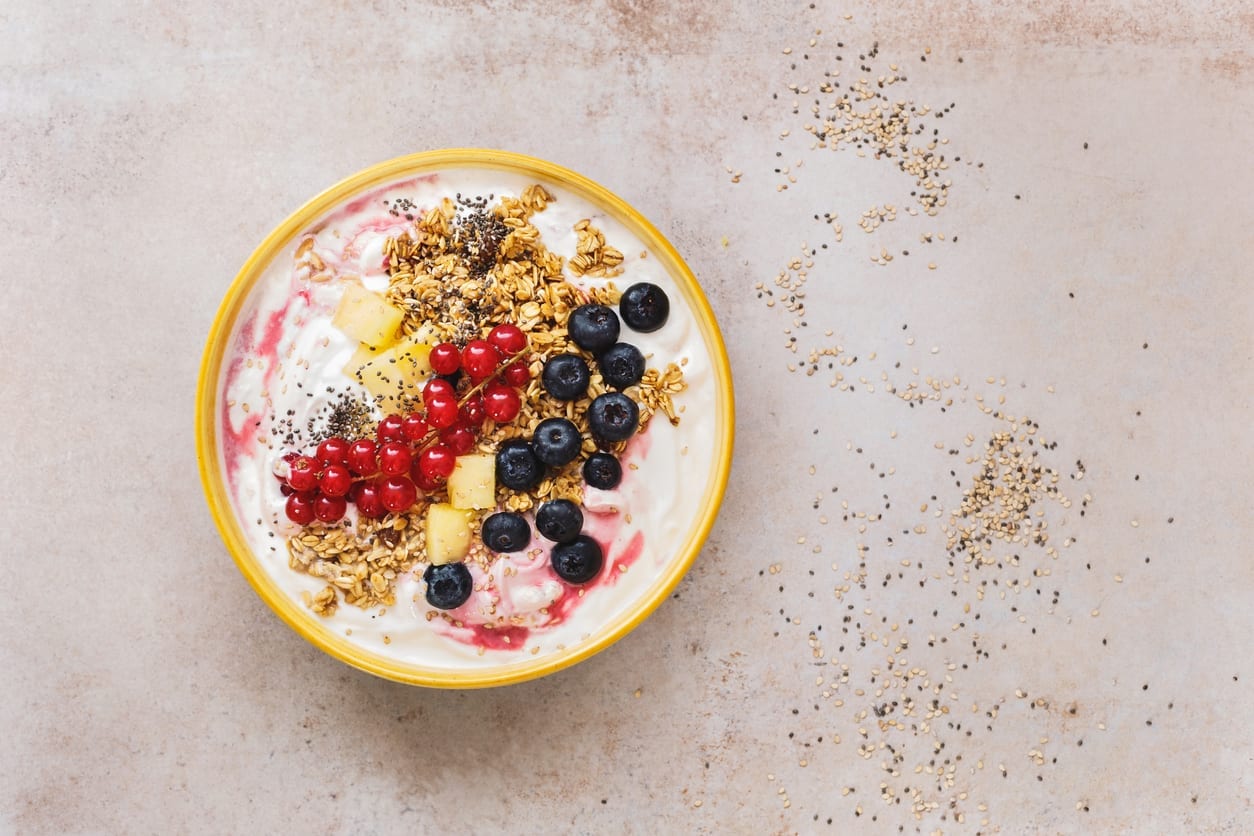
Servings:
- Serves 1 (double it to serve a teen or very hungry kid)
Ingredients:
- ¾ cup of frozen pineapple chunks
- ½ cup of frozen blueberries
- ¼ cup of milk of choice
Directions:
- Add frozen pineapple and blueberries to the blender. Blend at low speed until the fruit is cut into tiny chunks (about the size of a rice grain).
- Add optional kids’ protein powder and milk, and blend until the mixture is nice and smooth.
- Scoop into a bowl and top with blueberries, chia seeds, and almonds.
Purple Power Shake
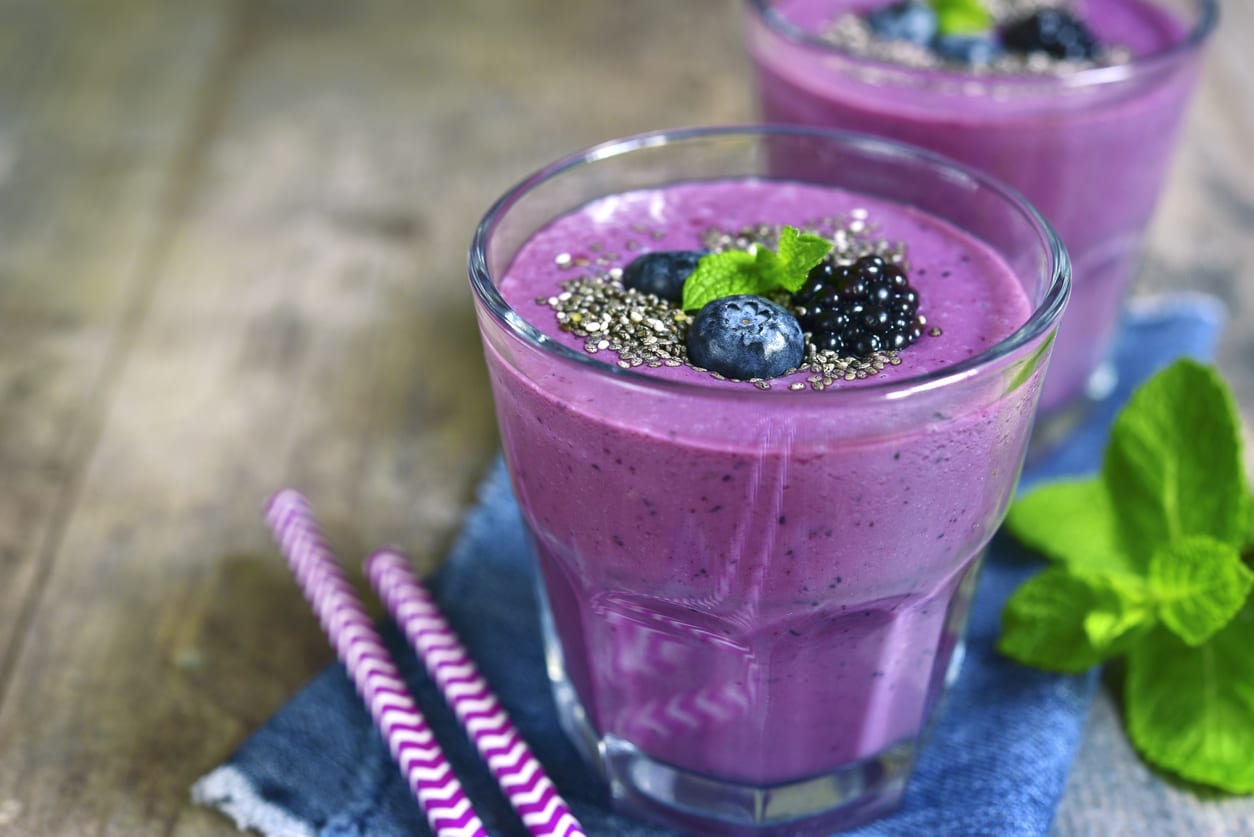
Servings:
- Serves 1-2
Ingredients:
- ½ cup of blueberries or blackberries, fresh or frozen
- 1 tablespoon of chia seeds
- ½ medium banana
- 1 cup of chilled water or milk of choice
Directions:
- Add all the ingredients above to your blender.
- Blend on high for 30-60 seconds or until smooth.
- Pour into cups, and serve with a straw. (Optional: Top with some blueberries or blackberries and chia seeds.)
2. Nuts and Seeds
Nuts and seeds are a good source of omega-3. They’re high in antioxidants, minerals, and vitamins — perfect support for brain health! Nuts also are a good source of vitamin E, which protects brain cell membranes from free radical damage.4,8 Walnuts are particularly beneficial for brain health with very high concentrations of DHA, a type of omega-3 acid that’s been shown to improve cognitive performance.5 Just ¼ cup of walnuts delivers 100% of the recommended daily intake of DHA. Cashews and sunflower seeds contain amino acids that help boost serotonin levels and relieve stress.14
Try this yummy walnut recipe to help your kids take advantage of these benefits:
Walnut + Date Energy Balls
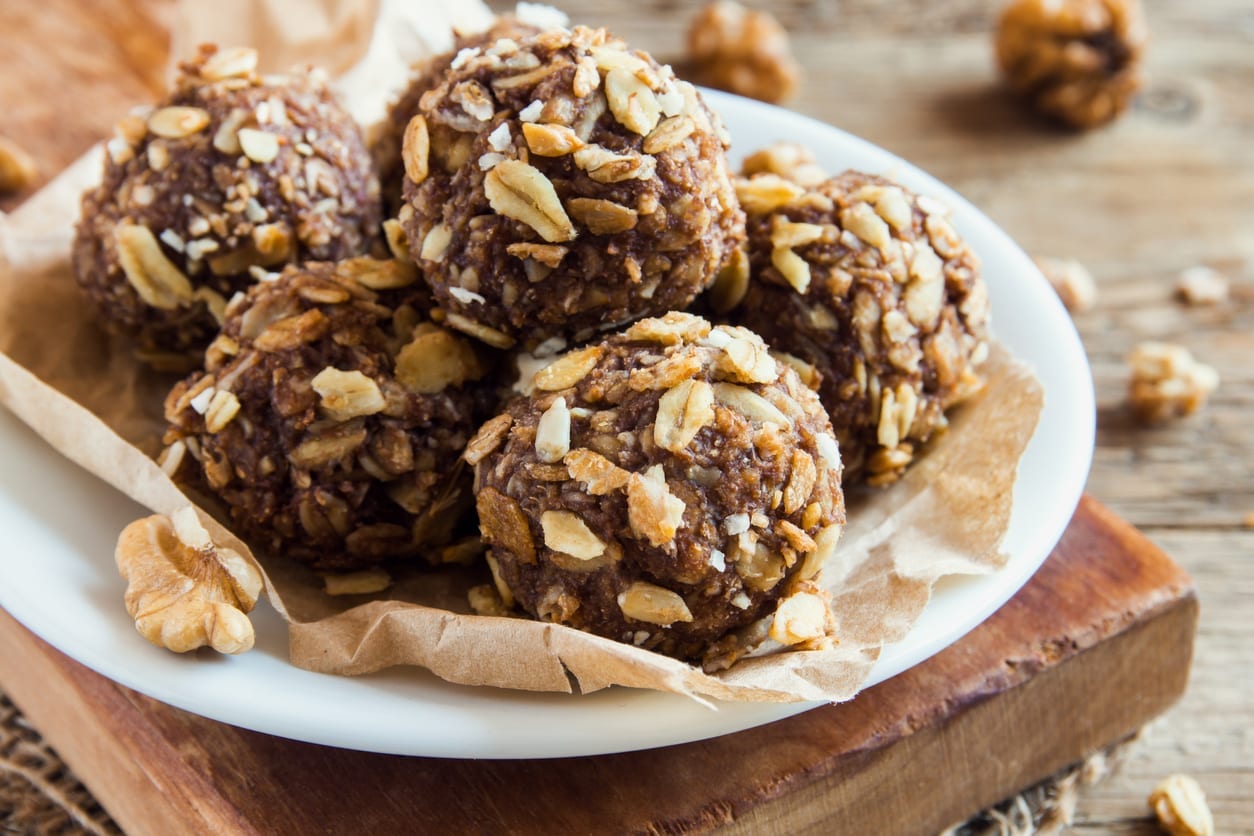
Ingredients:
- ½ cup of rolled oats
- ½ cup of chopped dates
- ¼ teaspoon of pure almond extract
- ½ tablespoon of honey
- ½ tablespoon of coconut oil
- ½ cup of roughly chopped walnuts (optional)
Directions:
- Place oats into a food processor or blender, and pulverize.
- Add the other ingredients and pulse until combined.
- Divide into eight portions, roll into balls, and serve.
3. Avocados
Besides being my favorite food, avocados are one of the best foods you can give your child to improve their overall health. Packed with good monounsaturated fats, avocados can help keep blood sugar levels steady and improve memory and cognitive function.6
The creaminess of avocados makes them the perfect smoothie add-in. My kids love to eat avocado in guacamole and as a topping for healthy toast. You can also try out this avocado recipe to make your child’s chocolate milk more nutritious:
Super Nutrient Chocolate Milk
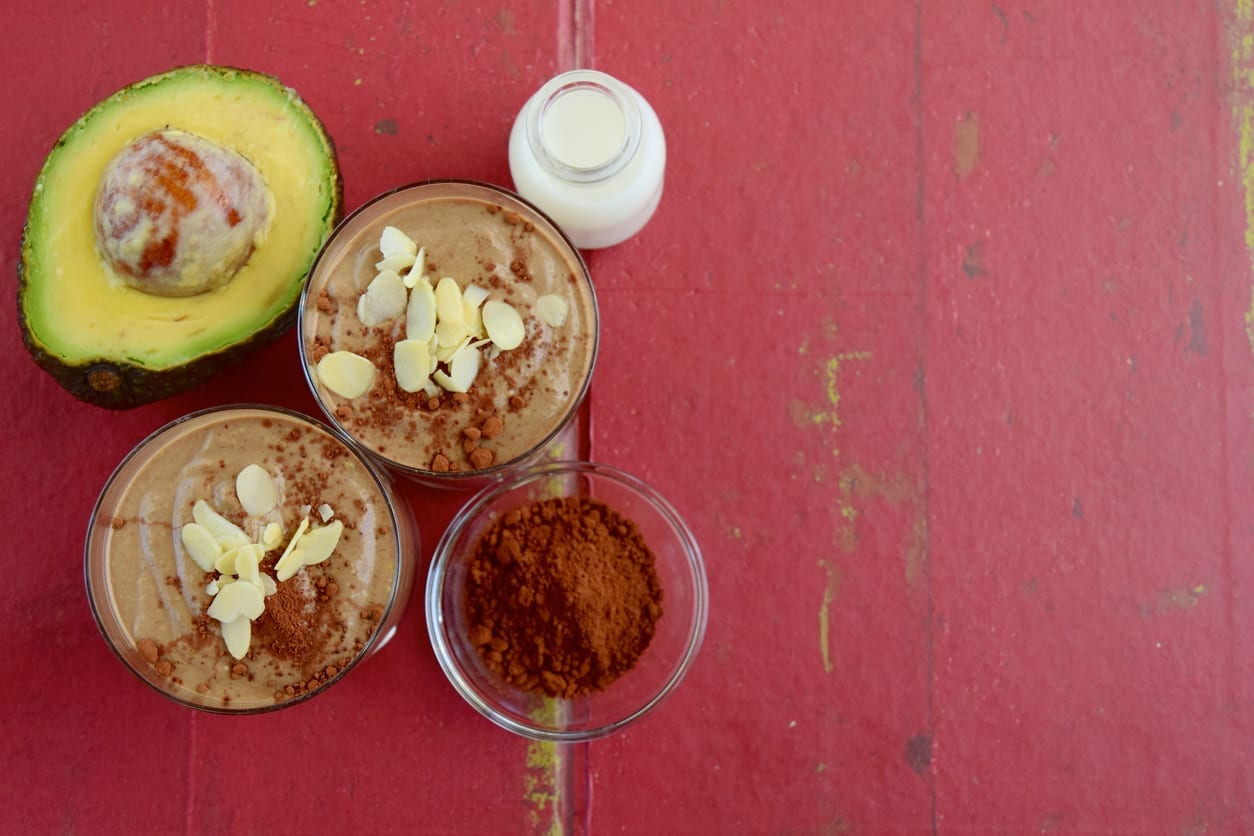
Servings:
- Serves 1-2
Ingredients:
- ¼ avocado
- 1 tablespoon of almond butter
- 1 tablespoon of cocoa powder
- 1 cup of chilled water or milk of choice
- A handful of slivered almonds
Directions:
- Add your ingredients to a blender.
- Blend on high for 60 seconds to make the milk really frothy.
- Pour into cups and top with slivered almonds (optional).
- Serve immediately.
4. Beets
The thought of feeding your kids beets may seem scary, but with such fantastic health benefits, it’s worth a try. Just don’t feed them beets in white clothes! 😉 Beets contain vitamins A, B, and C, as well as potassium, manganese, folate, soluble fiber, protein, carbohydrates, and antioxidants. These nutrient powerhouses have many benefits, such as boosting natural energy levels, preventing inflammation, and increasing blood flow to the brain, helping with mental performance.7
Here are two great kid-approved beet recipes! The beet smoothie is an especially great way to boost their brain power before school:
Beet Bounty Balls
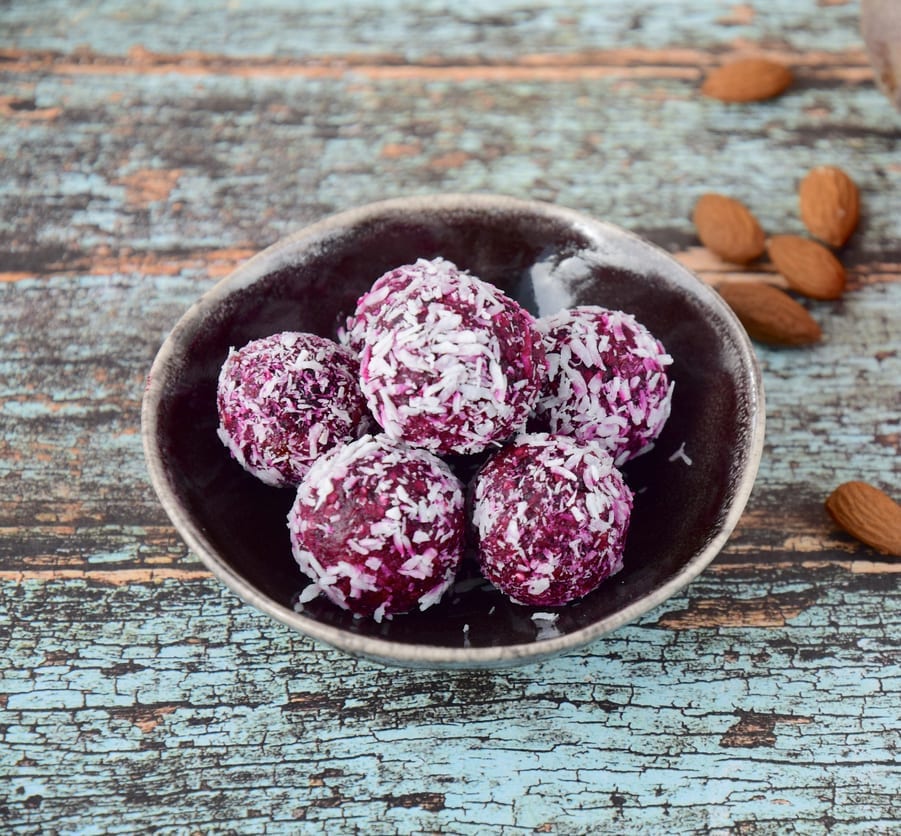
Ingredients:
- 2 ½ cups of shredded coconut
- 4 tablespoons of maple syrup
- Pinch of salt
- ½ teaspoon of vanilla extract or paste
- 1 tablespoon of raw beetroot
Directions:
- Place all the ingredients in a food processor or blender, and pulse until combined.
- Roll into balls. (Extra coconut for dusting is optional.)
- Place in the refrigerator for at least an hour, then serve.
Beet Brain Booster Smoothie
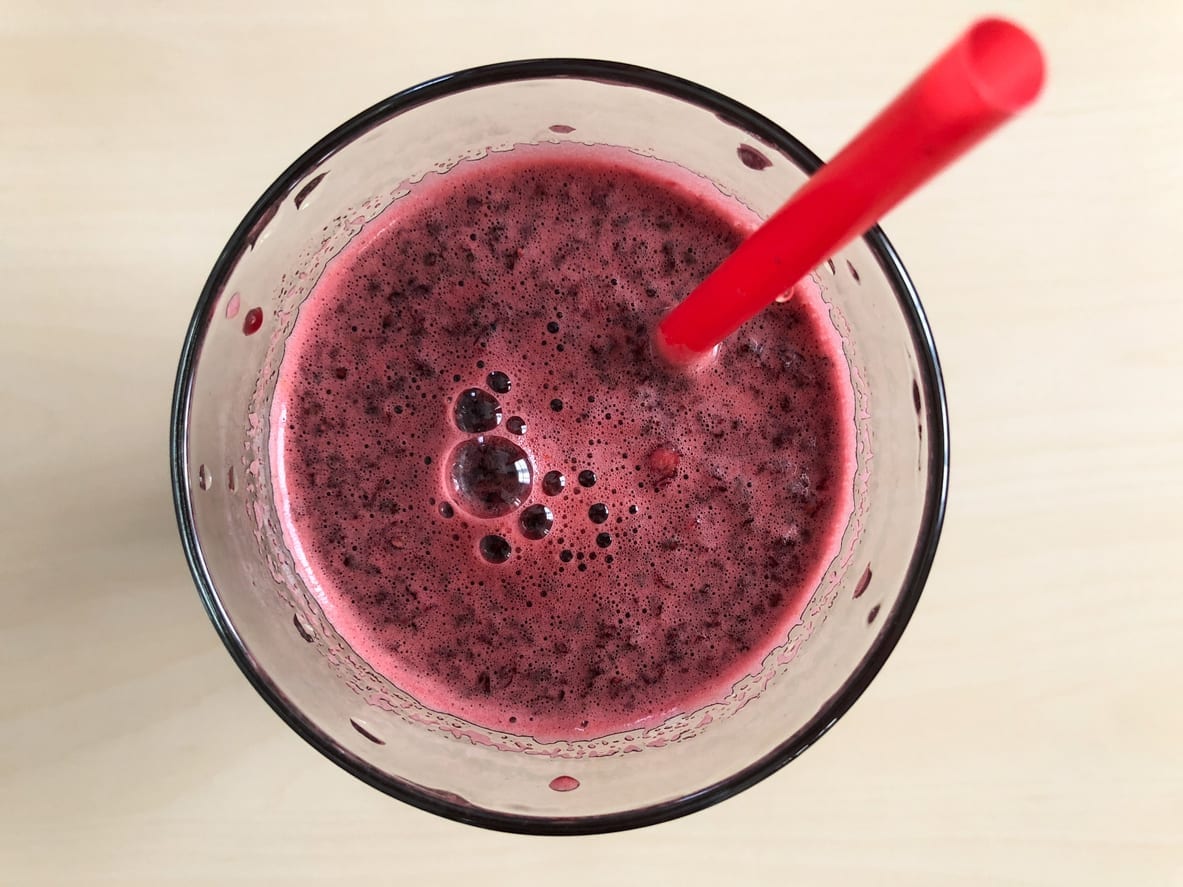
Ingredients:
- 1 cup of water or milk of choice
- ¼ raw beet
- ½ raspberries (fresh or frozen)
- ½ cup strawberries (fresh or frozen)
Directions:
- Place all ingredients in a blender.
- Blend the mixture until it’s smooth.
- Pour into glasses/cups and serve immediately.
5. Dark, Leafy Greens and Cruciferous Vegetables
Spinach and leafy greens like kale, chard, romaine, and collards are rich in nutrients like folate, iron, B vitamins, and magnesium.3,8,15,16,17,18,19 All these nutrients are essential to increasing your brain power.3,8,13 Also, they contain carotenoids, which are powerful brain protectors.20
While getting your children to eat lots of greens may seem incredibly difficult, there are some simple ways to do it. My kids’ favorite is including some greens into a smoothie or shake. Here’s a great smoothie recipe they’ll love:
Green Smoothie
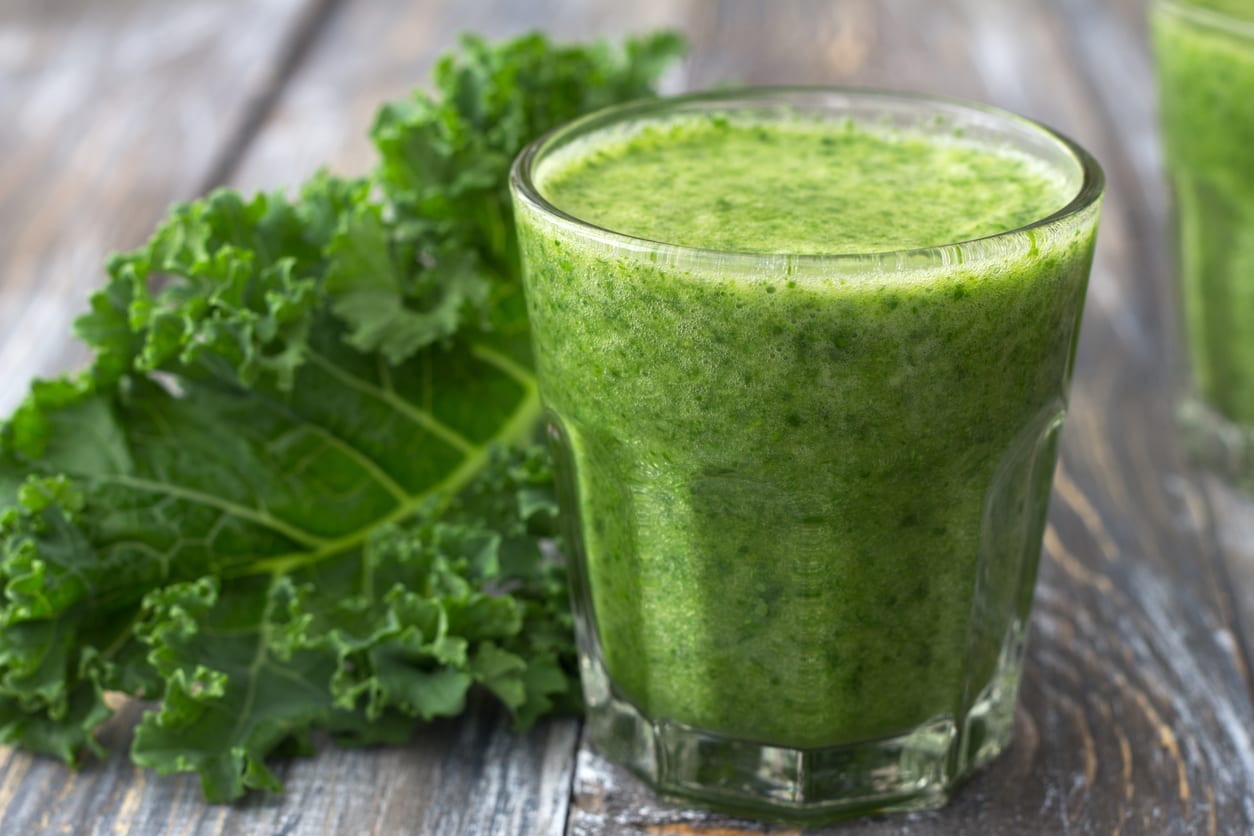
Servings:
- Serves 2
Ingredients:
- ½ cup of mango
- ½ cup of banana
- 1 cup of coconut water
- ¼ cup of unsalted macadamia nuts (can substitute with cashews)
- ½ cup of chopped kale
- ¼ cup of ice
- Protein powder (optional)
Directions:
- Add your ingredients to a blender.
- Blend it on high until smooth.
- Pour into cups and serve!
PRO TIP: School mornings are crazy, so I like to prep our green smoothie ahead of time. Layer all the fresh ingredients in a mason jar, put on the lid, and freeze it. Then, take the jar out 15 minutes before you want to make your shake to slightly thaw. Finally, place your ingredients in the blender with your optional protein powder and liquid. Healthy food can be fast, too!
6. Oats
Oats are complex carbohydrates that provide the fuel that the brain needs.21,22 This is opposed to simple sugars (pop drinks, candy, etc.) that create blood sugar highs and lows, which are not suitable for concentration and sustained energy.24 Complex carbohydrates have fiber and provide a slower, steadier energy release to your child.21,23 Also, the complex carbohydrates are broken down into glucose, which the brain needs to function. Most importantly, this slow release helps stabilize blood sugars and maintain concentration and attention.21,25 Oats are also full of B vitamins and folate, which are strongly linked to increased memory function.21
Here are two fantastic breakfast or snack recipes that feature oats:
Super Nutrition Pancakes
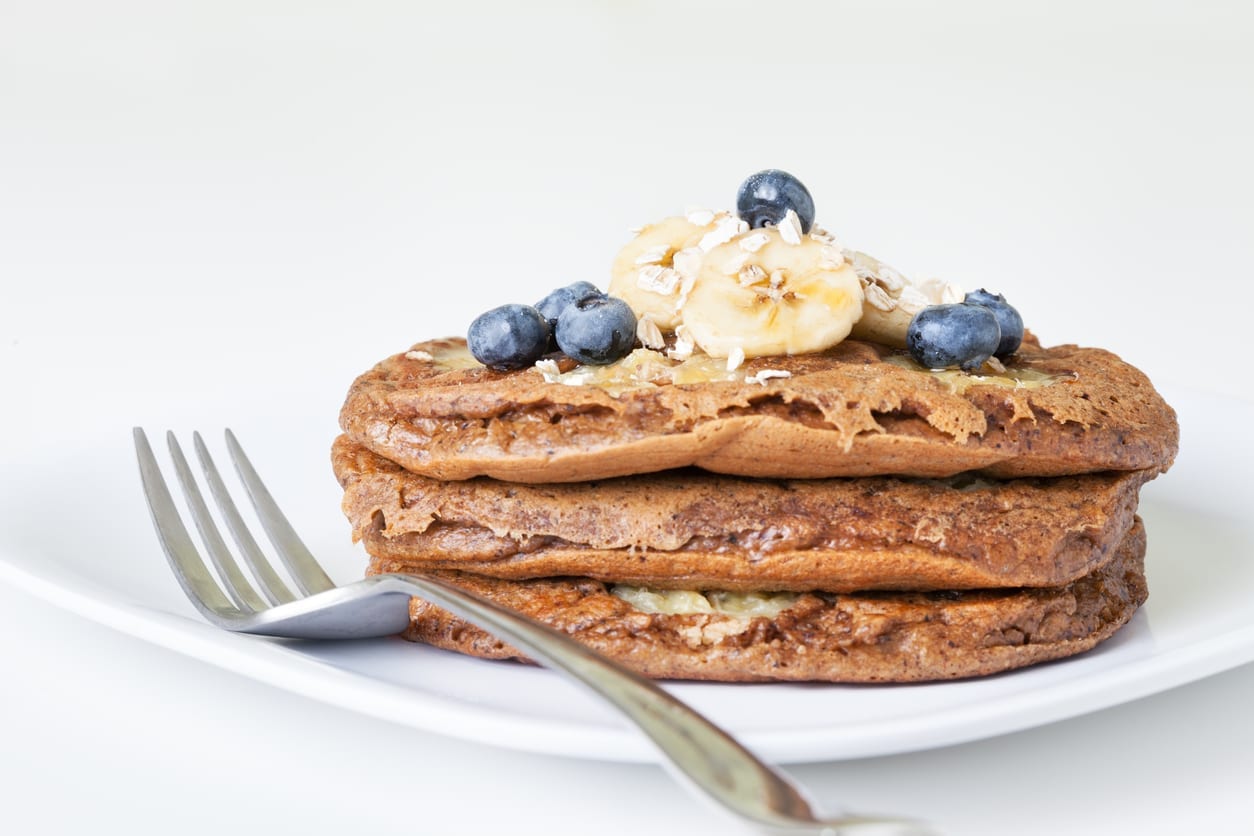
Ingredients:
- 1 cup of oats
- 1 banana
- 2 eggs
- 2 egg whites
- 1 tablespoon of baking powder
- 4 scoops of protein powder
- Fruit (optional toppings)
Directions:
- Place all the ingredients in a blender, and blend on medium speed until combined.
- Cook on a hot griddle, and transfer to a plate.
- Top with banana slices, blueberries or other fruit toppings, and a sprinkle of oats. Serve and enjoy.
Creamy Raspberry Breakfast Shake
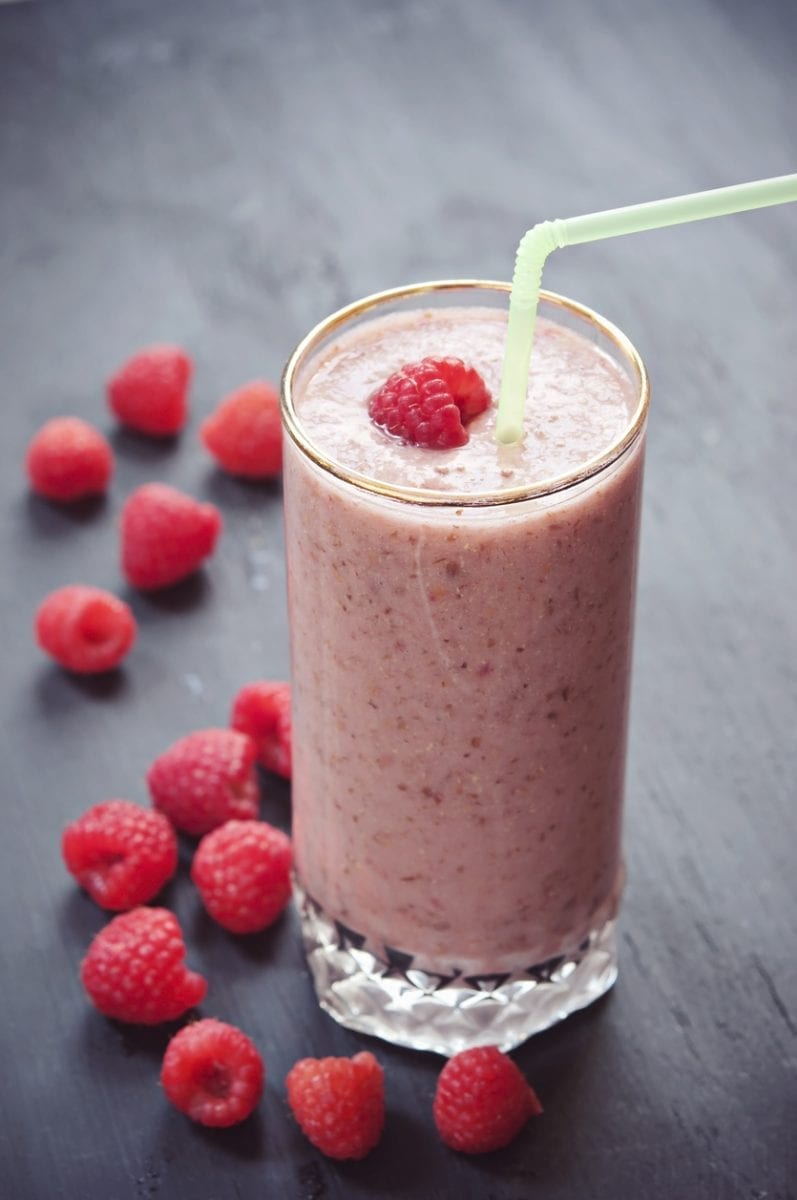
Servings:
- Serves 1-2 for breakfast
Ingredients:
- 4 scoops of strawberry-flavored protein powder
- ½ cup raspberries, fresh or frozen
- ¼ avocado (optional)
- ⅓ cup rolled oats (gluten-free, if needed)
- 5 cubes of ice
- 1 cup water or milk of choice
Directions:
- Add the ingredients above to a blender.
- Blend on high for 30-60 seconds.
- Once the smoothie is blended to your desire, pour it into cups and serve.
7. Water and Hydration
Not drinking enough water has detrimental effects on our brains. When your body lacks water, brain cells and other neurons shrink, and biochemical processes involved in cellular communication can slow.26 Water is excellent for memory sharpness and to help keep moods stable. Dehydration makes children listless, lethargic, and irritable.27,28 Therefore, get your little one to drink plenty of water and snack on high water-content foods like cucumber, watermelon, carrots, celery, and tomatoes.29,30
Note: Exercise is also essential to keeping our bodies healthy, including our brains! It keeps our brains sharp and improves cognitive functioning. Above all, aerobic exercise improves task performance and increases the ability to process information more quickly.31,32
And there you have it: seven brain-boosting foods for kids! If your kids don’t already eat these foods regularly, you’ll want to start incorporating them into their diets. Whether you add these fruits, vegetables, etc., to smoothies, breakfast foods, snacks, or other meals, your little one will be able to reap the benefits and boost their brain power.













